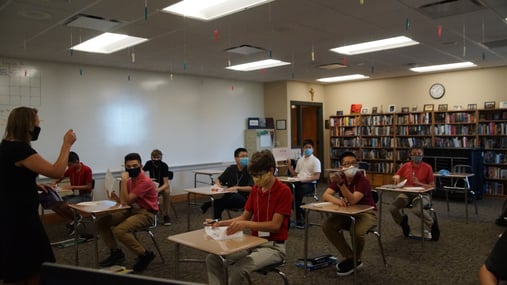
It can be a challenge for high school students to stay on top of their academics when they are continuously trying to balance a social life, extracurriculars and life at home. However, there are plenty of easy techniques that students can implement into their routine to guide them to continuously reach success in their high school careers.
Below are some tips and tricks that any high schooler can use to be successful in high school.
1. Manage Your Tasks with a Daily Planner and Folders
Before you walk into school each morning, it’s important to make sure you’re prepared for the daily tasks at hand. Using a daily planner helps you keep track of assignments and stay organized, as well as letting you manage your time more adequately. A physical planner is best, but there are a number of online tools and apps you can use on your phone or computer as well.
Write down each homework assignment in your planner as you get them. This way, you can create a to-do list. At the end of the day or during free period, you can set a specific time period for each task. If you’re not able to finish the assignment when you want it, work on something else and come back to the unfinished work later.
It’s also important to keep all homework assignments organized so that they can be easily found on a day-to-day basis. A folder for classes or a binder with dividers for different subjects lets you find find items quickly and easily.
If you struggle staying on top of your planner, make it fun with stickers, markers and other decorations. Instead of checking off a to-do list, place a sticker for each item complete or color in a box. How you organize your planner is up to you, but this strategy can be useful for students who are more crafty and struggle with making and keeping lists.
2. Be Prepared Beyond Assignments
There is more to being ready for the classroom than just completing assignments. While you’re doing your homework and you come across anything you don’t understand, make a note of it. Write down any questions you have to discuss with your teacher or parent. If you’re reading and come across a word you don’t know, mark it and finish the page so you don’t disrupt your flow. Then go back and look up the definition of the word.
If you find yourself with no homework (whoo!), it pays to stay ahead by previewing the next section of material the class will cover. Having this sneak peek will help you be prepared for class and can help you save time later on other homework.
3. Finding a Study Strategy that Works for You
There are countless methods students can use to study more effectively. There’s no one “right” way to study – it’s important to find the method that works best for you.
If you’re not sure what learning or study style you are, there are four basic modes of learning:
- Visual Learners (learn best via images, maps, graphs, etc.)
- Auditory Learners (learn best by talking)
- Reading and Writing Learners (learn best by written instructions)
- Kinesthetic Learners (learn best by doing)
Many students learn best by following a mix of these styles, but there are different methods for studying. Visual and reading/writing learners often benefit from practice questions and flashcards. Along with traditional paper cards, there are digital apps and online programs that can be utilized to help you study for that next quiz or test.
For auditory learners, audiobooks are a great studying tool as well as group study sessions. Kinesthetic learners often benefit from group discussions as well.
Try out these different methods to find the ones that work best for you.
>> Read Now: Is Boarding School Right for You?
4. Use Effective Reading Strategies
Ever had the experience of trying to read a textbook and just reading the same line over and over again? Or forgetting everything you read as soon as you’re done? These are signs that you’re not engaging in effective reading strategies.
When reading or listening to text, make sure you’re truly processing what you’re reading by following SQ3R. This stands for:
-
Survey – Scan the text visually before reading. See how it’s broken up, if there are any bulleted lists, bolded text, etc.
-
Question – Before reading, have some questions in your mind that will guide you. These typically are: Why am I reading this? (and not just “because my teacher told me to” – what are you going to get out of this?), What do I already know about this subject? And How does this chapter/section relate to my assignment?
-
Read – You got this! Read through the text like you normally would. You may find after scanning and questioning you’re able to get through the section faster than if you just launched into it unprepared.
-
Recall – As soon as you’re done, take a few seconds to remember what it is that you just read. This is the stage where you want to take notes – write down anything that seems significant or that you have questions on.
-
Review – Before you’re done homework for the night, go back and scan through your notes. Do you still understand the material? Or is there anything you still have questions on?
Not only can this help you focus on what you’re reading, but it can ensure that when it comes time to ask questions in class, you won’t forget yours.
5. Learn Self-Discipline
Being a high school student means a lot more responsibility. Self-discipline is a lifelong skill that you can hone while in school. While doing homework, use apps like Stay Focused block distracting websites while you’re working.
Another way to become more self-disciplined is to treat each new class period as if there were going to be a test. This way, you’ll be more prepared if there is a pop quiz, but will also have a better understanding of the material since you’ll spread out your studying instead of cramming the night before.
6. Reap the Benefits of Extracurricular Activities
Many parents are under the impression that they shouldn’t encourage their students to participate in extracurricular activities because it may hinder their ability to study effectively and do well in their courses. However, the National Center for Education Statistics reports that extracurricular activities can help reduce the likelihood of school failure or dropping out (source).
Often times, top universities want to see applicants who have engaged in a variety of activities during their high school career because they understand and believe in the benefit of these undertakings that well prepare a student for college.
Beyond just the practical benefits, extracurriculars help you learn to budget your time, practice collaborating with others and refine leadership skills. It’s also a great way to discover your passions and make new friends.
With these 6 tips and tricks, you can be better prepared for high school. In order to truly succeed in high school, it’s important to be self-disciplined and organized. You got this!
St. Lawrence Seminary is an all boys Catholic boarding school located in Mt. Calvary, Wisconsin. We welcome students from Minnesota, Illinois and across the United States. Inspired by the Gospel of Jesus Christ and the example of St. Francis of Assisi, St. Lawrence Seminary provides a residential college preparatory education in a living Catholic community nurturing mature, well-rounded men of faith. See if St. Lawrence is right for you and your son.

